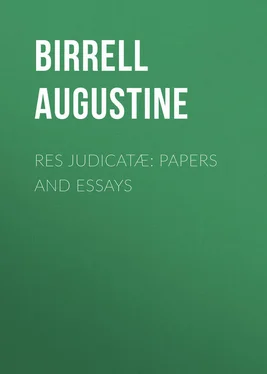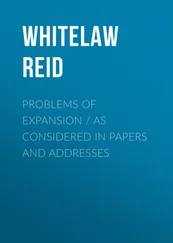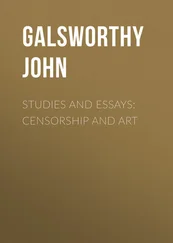Augustine Birrell - Res Judicatæ - Papers and Essays
Здесь есть возможность читать онлайн «Augustine Birrell - Res Judicatæ - Papers and Essays» — ознакомительный отрывок электронной книги совершенно бесплатно, а после прочтения отрывка купить полную версию. В некоторых случаях можно слушать аудио, скачать через торрент в формате fb2 и присутствует краткое содержание. Жанр: foreign_antique, foreign_prose, Историческая проза, на английском языке. Описание произведения, (предисловие) а так же отзывы посетителей доступны на портале библиотеки ЛибКат.
- Название:Res Judicatæ: Papers and Essays
- Автор:
- Жанр:
- Год:неизвестен
- ISBN:нет данных
- Рейтинг книги:3 / 5. Голосов: 1
-
Избранное:Добавить в избранное
- Отзывы:
-
Ваша оценка:
- 60
- 1
- 2
- 3
- 4
- 5
Res Judicatæ: Papers and Essays: краткое содержание, описание и аннотация
Предлагаем к чтению аннотацию, описание, краткое содержание или предисловие (зависит от того, что написал сам автор книги «Res Judicatæ: Papers and Essays»). Если вы не нашли необходимую информацию о книге — напишите в комментариях, мы постараемся отыскать её.
Res Judicatæ: Papers and Essays — читать онлайн ознакомительный отрывок
Ниже представлен текст книги, разбитый по страницам. Система сохранения места последней прочитанной страницы, позволяет с удобством читать онлайн бесплатно книгу «Res Judicatæ: Papers and Essays», без необходимости каждый раз заново искать на чём Вы остановились. Поставьте закладку, и сможете в любой момент перейти на страницу, на которой закончили чтение.
Интервал:
Закладка:
The book's origin ought not to be overlooked. Some London booksellers, knowing Mr. Richardson to be a grave man of decorous life, and with a talent for moralising, desired him to write a series of familiar letters on the behaviour of young women going out to service for the first time; they never intended a novel: they wanted a manual of conduct – that conduct which, according to a precise Arithmetician is three-fourths, or some other fraction, of human life. It was in this spirit that Richardson sat down to write Pamela and make himself famous. He had a facile pen, and the book, as it grew under his hand, outstripped its design, but never lost sight of it. It was intended for Pamelas, and is bourgeois to the very last degree. The language is simple, but its simplicity is not the noble, soul-stirring simplicity of Bunyan, nor is it the manly simplicity of Cobbett or Hugh Miller: it is the ignoble, and at times almost the odious, simplicity of a merely uncultured life. It abounds in vulgar phrases and vulgar thoughts; still, it reflects powerfully the scenes it portrays, and you feel as you read a fine affinity between the communicating medium, the language, and the thing communicated, the story. When people said, in the flush of their first enthusiasm, as they did say, that there were but two good books in the world, the Bible , and Pamela , this is what, perhaps unconsciously they were thinking of; otherwise they were talking nonsense. Pamela spoke a language still understood of many, and if she was not romantic or high-flown, there are others like her. We are always well pleased, and it is perhaps lucky for the majority of novelists that it should be so, to read about people who do not in the least resemble us; still, anyone who describes us as we are, 'strikes the electric chain wherewith we are darkly bound,' and makes humanity quiver right down the centuries. Pamela was a vulgar little thing, and saucy withal: her notions of honour and dishonour were neither lofty nor profound; but she had them and stuck to them in perilous paths along which the defenceless of her sex are too often called to tread; and when finally her virtue is rewarded, and she is driven off in a chariot drawn by the four long-tailed mares upon whom she had been cruelly twitted for setting her affections, I for one am quite prepared to join with the rustics round the blacksmith's anvil in loud cheers for Pamela.
Ten years after Pamela came Clarissa . It is not too much to say that not only Great Britain and Ireland, (the latter country not yet deprived of her liberties by the Act of Union, and therefore in a position to pirate popular authors, after the agreeable fashion of our American cousins, 2 2 Since abandoned, Laus Deo!
) but also France, Germany, and Holland, simply gulped Clarissa down; and she was in seven volumes. It was a kind of gospel, something good and something new. Its author was a stout tradesman of sixty, but he was not in the very least degree what is now called – perhaps to the point of nausea – a Philistine. By a Philistine I suppose we must understand someone who lives and moves and has his being in the realm of ordinary stock conventional ideas – a man who is as blind to the future as he is deaf to the past. For example, that Dr. Drummond, Archbishop of York, who just about this very time told the Rev. Mr. Conyers, one of his clergy, 'that he would be better employed preaching the morality of Socrates than canting about the New Birth,' was a Philistine – I doubt not a very amiable one, but, being a Philistine, he had no chance of recognising what this nascent methodism was, and as for dreaming what it might become – had he been capable of this – he would not have been a Philistine or, probably, Archbishop of York!
Richardson on the other hand had his quiver full of new ideas; he had his face to the east; he was no mere inheritor, he was a progenitor. He is, in short, as has been often said, our Rousseau; his characters were not stock characters. Think of Fielding's characters, his Tom Joneses and Booths, his Amelias and Sophias. They are stage properties as old as the Plantagenets. They are quite unidea'd, if I may use a word which, as applied to girls, has the authority of Dr. Johnson. Fielding's men are either good fellows with large appetites, which they gratify openly, or sneaks with equally large appetites, which they gratify on the sly; whilst the characters of his women are made to hinge solely upon their willingness or unwillingness to turn a blind eye. If they are ready to do this, they are angels; Sophia comes upon the stage in a chapter headed 'A short hint of what we can do in the sublime, and a description of Miss Sophia Western.' Poor neglected Amelia, whenever she is forgiving her husband, is described as 'all one blaze of beauty;' but if they are not willing to play this rôle , why then they are unsexed and held up to the ridicule and reprobation of all good fellows and pretty women. This sort of thing was abhorrent to the soul of the little printer; he hated Fielding's boisterous drunkards with an entire hatred. I believe he would have hated them almost as much if Fielding had not been a rival of his fame. He said he was not able to read any more than the first volume of Amelia , and as for Tom Jones , in the year 1750, he was audacious enough to say that its run was over. Regarded merely as writers, there can, I suppose, be no real rivalry between Fielding and Richardson. The superiority of Fielding is apparent on every page. Wit, good-humour, a superb lusty style which carries you along like a pair of horses over a level moorland road, incidents, adventures, inns, and all the glory of motion, high spirits, huge appetites, pretty women – what a catalogue it makes of things no doubt smacking of this world and the kingdom thereof, but none the less delightful on that account! No wonder Tom Jones is still running; where, I should like to know, is the man bold enough to stop him. But for all this, Richardson was the more remarkable and really interesting man of the two; and for the reason that he was the evangel of the new sentimentalism, that word which so puzzled one of his most charming correspondents that she wrote to ask him what it meant – this new word sentimental which was just beginning to be in everybody's mouth. We have heard a good deal of it since.
Clarissa Harlowe has a place not merely amongst English novels, but amongst English women.
It was a new thing for a woman to be described as being not only in herself but by herself commendable and altogether lovely, as triumphing in her own right over the cruelest dishonour, and rejecting, with a noble scorn new to literature, the hand in marriage of the villain who had done her wrong. The book opened the flood-gates of human tears. The waters covered the earth. We cannot weep as they used to do in 'the brave days of old.'
Listen to the wife of a Lancashire baronet: 'I verily believe I have shed a pint of tears, my heart is still bursting though they cease not to flow at this moment, nor will I fear for some time… Had you seen me I surely should have moved your pity. When alone in agonies would I lay down the book, take it up again, walk about the room, let fall a flood of tears, wipe my eyes, read again, perhaps not three lines, throw away the book, crying out: "Excuse me, good Mr. Richardson, I cannot go on, it is your fault, you have done more than I can bear;" threw myself upon my couch to compose; again I read, again I acted the same part, sometimes agreeably interrupted by my dear man, who was at that time labouring through the sixth volume with a heart capable of impressions equal to my own – tho' the effects shown in a more justifiable manner – which I believe may be compared to what Mr. Belfort felt when he found the beauteous sufferer in her prison-room. Something rose in my throat, I knew not what, which made me guggle as it were for speech.'
Читать дальшеИнтервал:
Закладка:
Похожие книги на «Res Judicatæ: Papers and Essays»
Представляем Вашему вниманию похожие книги на «Res Judicatæ: Papers and Essays» списком для выбора. Мы отобрали схожую по названию и смыслу литературу в надежде предоставить читателям больше вариантов отыскать новые, интересные, ещё непрочитанные произведения.
Обсуждение, отзывы о книге «Res Judicatæ: Papers and Essays» и просто собственные мнения читателей. Оставьте ваши комментарии, напишите, что Вы думаете о произведении, его смысле или главных героях. Укажите что конкретно понравилось, а что нет, и почему Вы так считаете.












